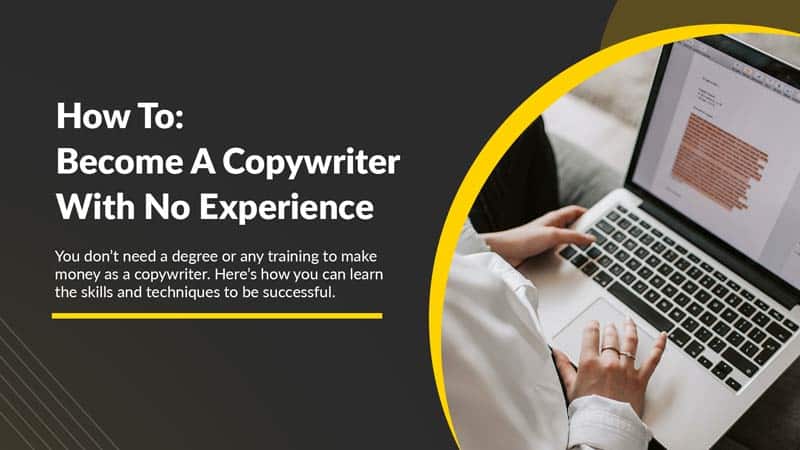When it comes to careers that allow you to work for yourself and live the digital nomad lifestyle, copywriting is probably one of the most popular options.
It’s a career you can get into with little or even zero experience.
Then, you can turn it into a successful journey where you improve your skills and earn enough to make it your sole source of income.
I’m not just saying this. I got into the copywriting industry with no previous experience or actual copywriting skills. All I had was somewhat of a knack for words, and a buddy that needed someone writing copy for their website.
Fast forward to today, and my copywriting skills help me generate over $20,000 in online income from this blog and my YouTube channels.
So, I’ll do my best to show you how to become a copywriter. I’ll be covering copywriting as an industry, all the different types of copywriting you can do, as well as a selection of things I wish someone had told me when I was starting.
Let’s get into it.
What is Copywriting?
Before we get into the nitty-gritty, let’s take a look at copywriting as an industry, what it entails, and a few tips and tricks that’ll help you become a full-time or freelance copywriter with an excellent copywriting portfolio the fast way.
Copywriting is “the activity of writing the text for advertisements or publicity material.” But in practice, freelance copywriting is more than just writing sales copy that you put on an ad. It’s a form of art you need to be good at to make it effective and persuasive, and it needs to sell whichever product you’re pushing.

Here’s a practical example. Let’s say you’re selling computers, and your website currently converts 1 in 500 people. As a freelance copywriter, your goal would be to look into the website’s copy and try to get it to a stage where it converts 1 in 100 people. And yes, you can get to a 5X improvement with just copy.
The thing about the copywriting business is that it can be incredibly rewarding. Once you develop a list of steady clients, you get to set your schedule, you get to enjoy the digital nomad lifestyle, and if you find that you’re good at it, the earning potential can be in the millions.
So, where do you begin?
Understanding the Types of Copywriting
Before I get to the things I wish someone told me when I first started, you need to have a good understanding of the different types of copywriting you’ll come across. They differ by purpose, with each of them having a specific goal, whether that’s conversion, advertising, or just pure entertainment.
A thing to note is that if I start listing every single type of copy, you’ll be long gone by the time I get to the interesting part. Instead, I’ll just cover some of the most common ones and why I think they’re the ones you should kickstart your career with.
Direct Response Copywriting
This is arguably the most common type of copy you’ll come across, and it has one single goal: provoke an immediate action from the reader, i.e. a direct response.
This kind of copy used to be long-form ads and sales letters, but we live in a digital day and age, which has completely switched up the game.
You could say that basically, every form of copywriting is trying to provoke a direct response – emails want the reader to click or reply, websites want the reader to click, sign up, or something similar.
Even social media copy aims to provoke a reaction from the reader. Thus, most of the other types of copywriting I’ll mention will sound like a subtype of direct response copy.
Email Copywriting
Email copywriting is relatively self-explanatory, and it entails the copy that’s written within an email that a brand or business sends out. It’s either for outbound or inbound marketing, with the former being similar to doing cold sales, and the latter trying to attract customers through content that offers insight.
Inbound email marketing campaigns are incredibly popular nowadays because they aim to use creative content that would attract potential customers to the brand or business. Such campaigns usually aim to collect visitors’ email addresses to establish communication, and then use that communication channel to sell to customers.
Email marketing is how a lot of businesses make significant revenue. When you’re a successful copywriter that knows how to create good email copy, this opens up a lot of high-income opportunities, making email copywriting a lucrative career.

Web Copywriting
This is the copy you’ll find on a static page, such as the homepage of a website, the about page, or even the contact page. This should be an informative copy that should line up with the brand identity and explain the core product or service to both new and returning visitors to the website.
For different businesses, web copy has a different goal. If you’re an e-commerce business, web copy should sell your product immediately. If it’s a local business, web copy aims to get the visitor to contact the business. This isn’t the type of copy that changes often, and there are tried-and-tested methods to making it successful, which makes it a good choice for beginner copywriters.
Blog Copywriting
Blog post copy is probably the least sales-focused writing a freelance copywriter can do. True, its end goal is to make sales and generate revenue, but it focuses a lot more on being informative and attracting visitors to the business and brand. It also ties in well with search engine optimization (SEO), attempting to rank the business or brand’s website as high as possible.
If you want to write an effective blog post (and get paid well for it), you need to be an expert on the topic. Surface-level research doesn’t cut it – you need to be able to do a deep dive on a topic within every blog post and keep readers engaged when it’s a topic they care about.
That being said, when you’ve found your niche, this is another good choice for beginner copywriters with no experience.
Social Media Copywriting
The last type of copy I want to cover is social media, which is very useful, and very easy to get wrong if you don’t know what you’re doing. I still bring it up because it’s always in demand, and because you can become good at it if you’re a people person.
Every brand’s marketing department wants someone in their team that can write copy that converts on social media.
Social media copy can vary wildly when it comes to intent, depending on the channel, the specific post, and even the situation at hand.
One minute you’re entertaining potential customers, and the other you’re trying to sell a product – you need to be good at everything. That being said, the digital world revolves significantly around social media, allowing you to make a significant impact with social media copy.
Which One Should You Go For?
Well, different people will be good at different things. I started with blog copywriting, working for different individuals and marketing department teams within companies.
During that time, I observed some of my teammates that did great when it came to web, email, and especially social media copywriting, and I’d like to think I learned a thing or two.
It’s a very individual thing, but if you aren’t sure which type of copywriting you want to become as good as possible in, why not try a few of them out? Maybe email is your thing, or maybe you’re best with social media. You never know until you’ve tried, embrace that on your journey to become a copywriter.
That’s the beauty of the copywriting business – you can try freelance copywriting for, say, Google Ads. This is just a single example, but if it doesn’t suit you, switch to landing pages. Or other internet ads, sales letters, or anything you want.
Why Do People Hire Copywriters?
Producing copy can be time-consuming and often requires a level of skill many people or marketing departments simply don’t have the time or resources to develop. Also, some types of copy are best left to experts that know a thing or two about copywriting. Every single successful freelance copywriter banks on this.
Here’s an example to put things into perspective. Let’s say you’re starting a clothing brand. You need a website for your brand, you need descriptions for all your products, social media channels for the brand, and an email campaign for potential customers, and that’s before we get into ads.

I just covered the basics, but these basics require web copy, email copy, social media copy, and ad copy. Can you, as a business owner, write all that copy, make it successful, and still have enough time and gas in the tank to run your actual business?
Or would you rather have dedicated copywriters that work within the marketing or advertising teams, and take care of all this? I know what my answer is, and that’s why people hire copywriters.
If you take a look at some of the best copywriting examples, you can see why. These are extremely successful companies who know just how important good copy is.
What I Wish I Knew Starting Out
This may be a bit controversial, because some successful copywriters may think that there’s a different list of priorities. But this is mine, and these are all things that I wish someone told me when I was starting. Would I have taken a different route if I knew them? Probably not, I’m happy where I am in my career, but if I knew these things upfront, I would’ve gotten here faster.
I don’t have very niche experience, nor do I want to give very specific advice that may not apply to your copywriting journey. Instead, I’ll stick to the broad strokes and not get into details.
Find Your Niche
The first thing that you need as a freelance copywriter, regardless of experience, is knowledge about the subject matter you’re writing about.
Don’t get me wrong – I’m not saying you should be an absolute expert on the topic (although, it certainly helps). But you do need to know more than the average Joe because one of the goals of your copy will be to educate the average Joe.
Is there an industry, or a broad topic, that you know a lot about? When I was starting, that industry was IT. I’ve been around computers my entire life, which meant that I knew how to find relevant information for the copy I needed to write, and I knew how to filter out things that didn’t matter to my target audience.
You need such a niche when you’re starting. It’s going to remove the “I don’t know anything about this” factor, which goes a long way.
It’s going to let you focus on things like language, length, target audience, and other factors that impact your copy significantly while putting things like research on the back burner since you already know a few things on the topic.
To add to this, that knowledge will also allow you to pitch to the right clients, making your job hunt a lot easier. Let’s say you’re a gym rat and know a lot about fitness and nutrition. You check out a few gym websites, and notice the copy isn’t exactly what it should be – here’s a potential client list for you.
Rewrite a gym’s copy to be more effective, use more persuasive call-to-actions, and let them reap the benefits of your work. Once you have a testimonial, plenty of other gyms might become clients, too.
But if those other gyms see a testimonial from an unrelated industry, they probably won’t be as interested. Find your niche, learn as much as you can about it, and stick to it.
You’d be surprised at how many freelance copywriters focus on exactly their niche and work on honing their copywriting techniques to perfection. They aren’t interested in anything other than their personal niche, but that very specific expertise allows them to become the top paid copywriters in said niche.
Most copywriters make the mistake of focusing on too many things at once. This isn’t just my personal opinion – you can’t be an expert on everything. The sooner you get your personal niche started and tailor your writing style to it, the better.
No, You Don’t Need a Degree
This is one of the most common misconceptions when it comes to becoming a freelance copywriter – you don’t need a degree for that. Don’t get me wrong, having a degree in journalism or similar industry will probably help you when it comes to skills like research and actual writing, but it’s not an absolute necessity.
When you start looking into jobs as a full time or freelance copywriter, you quickly realize that what most potential clients are after is someone with a flair for writing, not someone that has a fancy degree.
More often than not it’s your knowledge of the subject and your way with words that will land you the job, not your degree

That being said, if you’ve never dabbled in writing, a good way to get started is to grab a short copywriting course that gets you started and introduces you to the basics. I’m not going to lie and say that’s what I did – I skipped that completely. But if I had looked into a copywriting course back then, it would’ve probably made my job a bit easier when I was starting.
Focus On a Portfolio Instead
You don’t have experience, and you don’t have a degree. This takes away two of the three things you can show to clients, but the third one is arguably the most important: a portfolio. A portfolio will show clients what you can do much easier than a degree or a claim of experience.
But how do you create a portfolio of projects before you’ve worked on a project?
That’s easy – practice! I did this a lot when I was starting. I would find topics that interested me, did tons of research, and wrote articles that I didn’t use, but I would read through once I was done writing. I was very self-critical, and I tried to be honest with myself when something wasn’t looking good.
When you’re creating a portfolio, you could even try and find a couple of websites where you find that the copy isn’t doing its job. A good example would be a website for a service that doesn’t lead you towards actually getting that service. Another example is a website that should sell a product to you but fails at making that product look perfect in your eyes.
Then, try and improve that copy. See where you could use more effective CTAs, or where you could rephrase negatives to sound a bit more engaging and optimistic. You could even go as far as to send your suggestions to the website owners – you never know when you might land a new client.
The downside to this is that you can’t see the website metrics and you won’t know whether or not your copy was as efficient as you intended. But if you do find a website owner that’s willing to try with your copy, that may change, and you’ll have a valuable project to add to your portfolio.
If you’re an absolute beginner and have no previous work to showcase, consider offering your services for free for the first few clients. Yes, you won’t make any money from this, but you can then leverage and showcase the copy you wrote for them to land future paying clients.
Or, the clients you did the free work for might love your writing and offer you more paid work.
As far as a portfolio goes, you don’t need a hundred pieces of copy to show. Instead, you need five or so that showcase your best work, your expertise in the subject matter, and the value you can provide to your client. You don’t even need a website – a Google Drive (or alternative cloud storage) folder is enough.
A Website Might Help, Too
If you want to go the extra mile, though, a website is certainly beneficial. You can have a portfolio section that showcases some of your finest work, but you can also have a section that shows clients you’ve worked with (when you’ve worked with real-world clients), as well as an about section, and a contact section.
What a website does, apart from being an info point for you and your work, is it allows you to practice your copy. You get to practice web copy when you’re creating the website, blog copy when you’re creating your blog section, and direct response copy when you want potential clients to reach out to you for work opportunities.
You don’t have to pay thousands for a developer to create a website. All you need to pay for is your domain and hosting. The rest you can do with a free WordPress or Wix template and a couple of YouTube videos.
Do Your Own Thing
This was a difficult challenge for me, personally, because the tiniest thing could distract me from what I was set on doing. In the world of copywriting, it’s easy to see another copywriter that’s successful in a different industry and think “maybe I’m in the wrong industry”. You’re not, and the industry you’re in doesn’t dictate how successful you’ll be.
Instead, you should stick to the niche you’ve selected, and do your absolute best to become an expert within that industry. Even better, stick to the type of copywriting you’re best at – practice should reveal what that is. Maybe you’re good at improving conversion rates, or maybe you’re great at persuasive email newsletters that drive traffic.
It’s very easy to get distracted by what others are doing, but I’ve found that trying to be the best at everything often ends in being the best at nothing.
There’s a famous quote by David Allen, who is the mastermind behind the Getting Things Done productivity ecosystem, which says You can do anything, but not everything. And that certainly applies when you want to become a copywriter.
If you keep your focus on the niche and type you’re good at, you’re giving yourself a boost in productivity. This is always needed when you’re starting something new (in this case, a career in copywriting). Maintain your focus, and don’t lose sight of the niche you’re trying to become an expert in.

Individuals Versus Agency Copywriters
Freelance copywriters often have the choice between going for a solo copywriting career, or becoming a professional copywriter within marketing agencies. As an individual, you do your own thing and find your own clients. This also means you get all your clients’ money, as opposed to getting paid by an agency.
There’s a certain amount of freedom that a freelance copywriter journey can get you, and even a few good contacts in the industry can result in a few big wins. You can work on becoming a good copywriter and build your copywriting career as you see fit, without answering to nobody.
On the other hand, agency copywriters don’t really deal with clients directly. Instead, they’re given briefs and tasks to work on, which limits how much they can expand their writing skills outside of the jobs they’re given.
When you’re trying to build a simple copywriting portfolio, working for a direct marketing agency isn’t too bad. They’re always hiring writers, and you can learn copywriting by working with other writers within the industry – peer-to-peer skill sharing is always a good idea.
Once you’ve got a solid copywriting portfolio, you can then move up in the online copywriting world, create your own website, own blog, and start pitching yourself as a freelance writer to clients.
Don’t Wait!
As is the case with many other careers, you learn the most about copywriting by, well, writing copy. You don’t have to spend years practicing before you pitch your first client. The sooner you start, the better. You might be surprised at how good you are, but you’ll never know about it until you’ve tried it.
What if the first cold email you send to a potential client is a success? What if you end up tripling their sales with a couple of social media posts and an email or two? That’s an immediate boost to your career, and a testimonial you can use pretty much straight away when pitching to other clients.
The sooner you start, the sooner you’ll get client feedback, too, which is invaluable. Most clients will be able to give you exact pointers on what they think you’re good at, and where you could further improve. The better you are at welcoming such feedback and implementing it within your copy, the less criticism you’ll face.
And this is the perfect segue into the last big thing I’d like to discuss: getting copywriting clients.
Cold Emailing is Boring, But Worth It
This is a huge thing I wish I knew when I started my career as a freelance copywriter. I was under the impression that very few copywriters get a job by cold emailing, which is very traditional advertising advice. The thing is, you can easily land a copywriting job if you pitch your copywriting services to the right client.
Almost every successful copywriter has done cold emailing as part of their career path, and they’ll all say that it’s a great way to land a copywriting gig directly. If you want to become a successful copywriter, it’s something you’ll need to do. It’s also the easiest way to land a client.
Sending 50 emails and a landing single ad copywriting job is much easier than spending months on copywriting gigs websites and trying to make a few hundred dollars, and every freelance copywriter worth their weight can attest to this. You can then add that client to your simple copywriting portfolio and use them to land even more copywriting gigs.
A neat bonus when you’re cold-emailing is that you’ll get to practice writing email copy and improve your copywriting skills if email copy is something you’re interested in. Many corporate copywriter jobs will require you to know how to write email copy, and almost any good copywriter has this in their toolbox.

A Few Tools to Get You Started
Now that you’ve got answers to some of the most common questions, you’re ready to get started. You have a portfolio, you’ve got cold emailing dialed in and you’re ready to start working. Here are a few tools that will certainly help make your copywriting experience a bit easier, and help ensure the quality is high from the get-go.
Grammarly
Arguably the most underestimated tool in any copywriter’s arsenal, Grammarly will help you make sure your copy is free of language errors. Not only does it help with typos and grammar, but it also helps with clarity and keeping things easy to understand. It’s free for the most part, but if you’re serious about copywriting, you should consider the premium subscription and the extra features it comes with.
YoastSEO
While technically YoastSEO is an SEO-oriented tool, you can still use it for general writing. It helps you with sentence and paragraph length, as well as subheadings and distribution. This makes it incredibly effective when you’re working on your copy’s structure, especially with long-form copy such as blog posts. It’s completely free, too.
Plagiarism Checker
I’d suggest you choose between DupliChecker and SmallSEOTools’ plagiarism checker. Both are equally effective, and will tell you if your content matches something that has already been published. Google’s algorithm punishes that severely, which is why it’s crucial that you avoid having the same copy with another website.
Websites To Help You Find Jobs
If you’d rather not start with cold emailing for some reason, there are plenty of websites that offer copywriting jobs for writers with various levels of experience (or with no experience whatsoever). I’d suggest you steer clear of Upwork, Fiverr, and similar “job fair” type of websites, and instead look into something that’s copywriting specific. Here are a few good examples.
- www.freelancewriting.com
- www.copywritingjobs.net
- www.freelancewritinggigs.com
- www.contentwritingjobs.com
- www.problogger.com
These are far from the only websites where you can find a copywriting gig, but they’re a great place to get started.
So, Can You Become a Copywriter With No Experience?
Yes, you can. It will take practice, persistence, and probably plenty of cold emailing with no response until you land your first client, but it’s all uphill from there. Knowing how to become a copywriter with no experience or formal education can lead you towards copywriting gigs that do more than just pay the bills.
Copywriting is an incredibly rewarding career in more than just a financial sense, though. You can help brands and businesses achieve their goals when it comes to sales and revenue, and I can tell you from personal experience that the sense of achievement you get from that is oftentimes more valuable than the money you make.
You don’t just write copy. You aren’t just a copywriter or just a writer. You’re the reason why your client’s sales letters are successful, and why their website suddenly started converting leads into customers, and customers into repeat customers. These may seem like not huge jobs, but in your client’s eyes, they’re a major success.
Of course, you can make an excellent income once you’ve made a name for yourself, and copywriting is a career that can help pay the bills and afford a comfortable lifestyle. Don’t believe me? Give it a try, and come back in a few months. I’ll be waiting to hear your success story.
FAQ
How Do I Break Into Copywriting With No Experience?
It’s all about finding that one niche you’re good at, practicing writing different types of copy, and then pitching clients. When you’ve landed a few that will help you make a name for yourself, you can use their testimonials to land even more clients and increase your network (and income).
What Qualifications Do You Need To Be a Copywriter?
None. You don’t need qualifications or formal training, though it may help when you’re trying to land a client. All you need is a good grasp of the language you’re writing in, a good understanding of your client’s problem and how to solve it, and a good portfolio that will showcase what you’re capable of.
Are Copywriters in Demand?
Yes, there is always a demand for copywriters as more brands and businesses start to realize the value of a well-written copy. The digital world we live in revolves around copy, and the need for good copywriters isn’t going away anytime soon.
Are Copywriting Jobs Hard to Get?
Yes and no. This depends on the specific type of copywriting you do, as well as your skills and portfolio. Here’s a fact: there’s always work for a good copywriter that can understand and solve their client’s problems.





